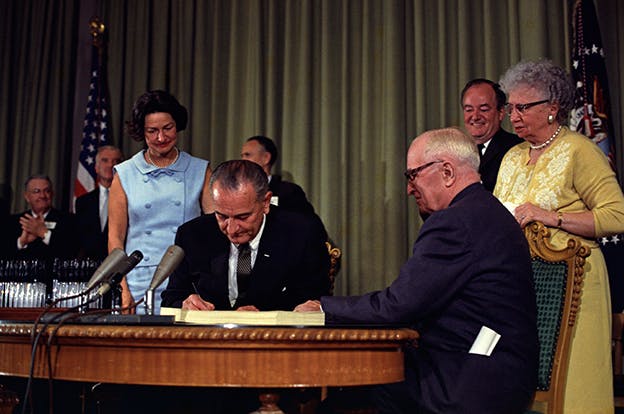August 7, 1912
The Progressive Party proposes "a single National health service" in their platform.
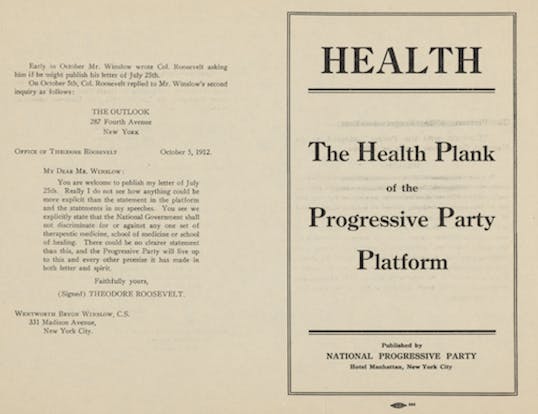
March 25, 1916 Health Insurance
“Health insurance will give the American business man a direct, pecuniary interest in combating tendencies toward disease in the general population. There is no more efficient organizer in the world than the American business man.”
May 20, 1916 A Government Plea for Health Insurance
“Only a small portion of wage-workers are now insured, and there is no likelihood that the more poorly paid workmen who stand most in need of insurance will obtain it in time to prevent a deterioration that society cannot permit.”
September 1, 1918
State health insurance bills are struck down in California and New York.
July 15, 1935
Senator Arthur Capper introduced the first government health insurance bill in Congress.
August 14, 1935
President Roosevelt signs Social Security Act into law. The act does not include health insurance.
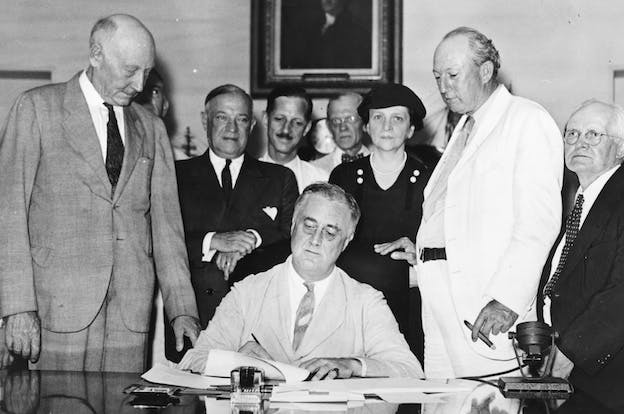
February 17, 1937 Health Insurance—The Next Step
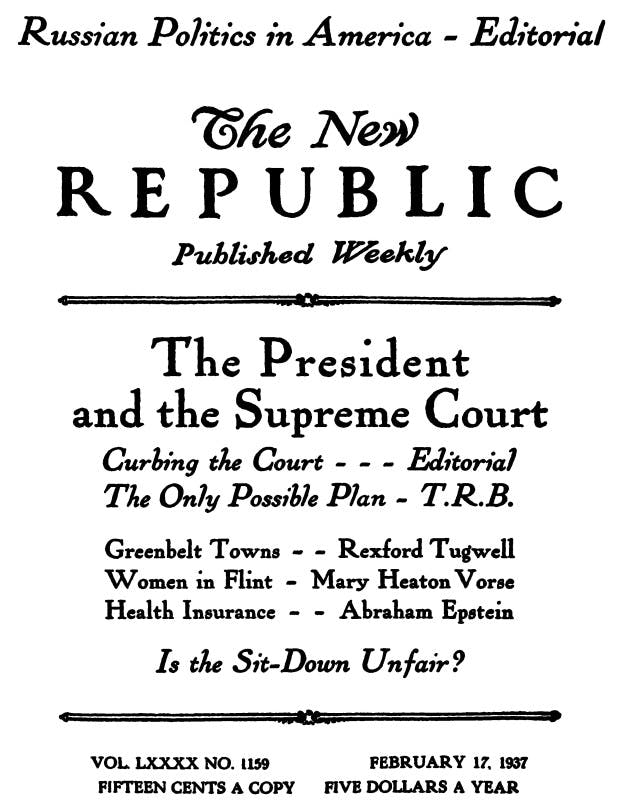
“With the highest proportion of doctors to population in the world, millions of Americans have to resort to public medical charity or go without care because they cannot meet the cost of illness.”
February 28, 1939
Senator Robert F. Wagner proposes a "National Health Bill," which is defeated later that year.
November 1, 1942
In Britain, the Beveridge Report advocates for a comprehensive social welfare system. As a result, the National Health Service is founded in 1948.
December 14, 1942 The Beveridge Report
“Britain is seeking to justify her war sacrifices and to pay tribute to her dead by making a better world—the only tribute, incidentally, in any country at any time, that can be made with clean hands to youth fallen in battle.”
April 19, 1943 The Health Program
“As long as organized medicine in the United States continues to shirk its public duty while fighting a defensive battle against what it regards as lay encroachment upon its province, so long will both doctors and their potential patients suffer, and so long will the nation pay a gigantic bill for preventable illness.”
June 3, 1943
Senator Robert Wagner and James Murray and Representative John Dingell introduce a bill that would reform Social Security to include a compulsory national health-insurance program.
July 10, 1944 Medical Care for All Americans
“In his recent message to the Congress on the State of the Union, President Roosevelt included 'the right to adequate medical care'...as an essential for an Economic Bill of Rights for the American people. It is now up to the Congress to translate into reality this wish and need of the vast majority of the American people.”
May 3, 1948 Playing Politics with the Health Issue
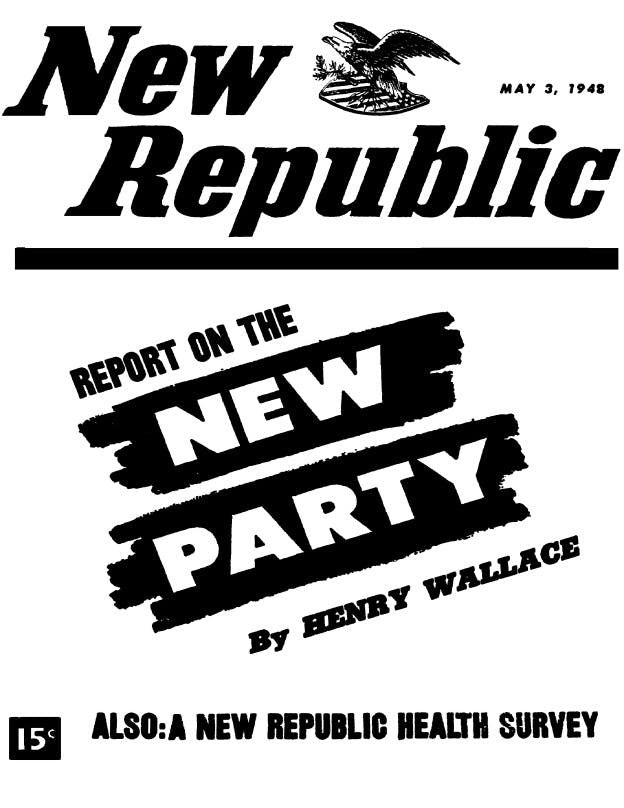
“On health, President Truman can match his record proudly with that of Roosevelt, at least as far as verbal expressions are concerned. He is the first President to address a special message to Congress on the subject, and to repeat his demand for an adequate medical-care program in budget and other messages to follow.”
October 2, 1950 The Crude Big Lie
“In its desperate attempt to kill public interest in any form of federal aid—to train doctors, build hospitals, encourage research or lower medical costs—the AMA has wandered from its original purpose... It has become a politically-minded, publicity-seeking organization.”
June 7, 1956
A military health insurance program is established for Armed Forces dependents.
August 27, 1957
The Forand bill is introduced to Congress. It would provide health insurance to beneficiaries of social security. It is defeated in June that year.
May 9, 1960 Watch Out for Grandpap
“Hippocrates, not Eisenhower, socialized medicine when he swore his students to put the welfare of the patient ahead of their own profit. If the time ever comes when American medicine is not socialized, it will no longer be a profession, but merely a pill-peddlers’ syndicate, commanding no more public respect than the Pants Pressers’ Protective League.”
August 23, 1960
Senator Robert Kerr and Representative Wilbur Mills propose a bill that provides limited, means-tested health insurance to the elderly. It is signed into law in September, but adopted in only 28 states.
February 13, 1961
Representative King and Senator Anderson introduce a bill to pay for hospital care for over 65s through Social Security.
March 12, 1962 Medical Care for the Aged
“That some assistance to those hardest hit by chronic illnesses, diminution of income and rising medical costs must be given is widely accepted. But there is wide divergence on how it should be done.”
November 9, 1963 Time the U.S. Caught Up
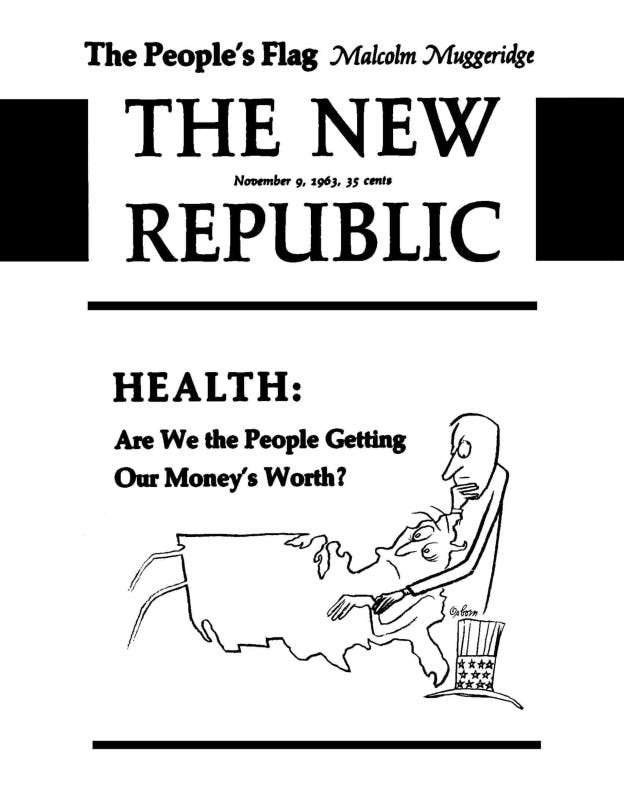
“We are not suggesting that the government come between the doctor and his patient. We are suggesting what every other major, developed, intelligent country did for its people a generation ago.”
November 22, 1963
The assassination of President Kennedy halts hearings on King-Anderson bill.
February 10, 1964
President Johnson proposes "Hospital Insurance for the Aged" in a special message to Congress.
October 17, 1964 How Medicare Was Lost This Year
“The pressure on the Senate group was severe. In the end, it was from the White House that the word came to hold firm. It was felt that cash benefits this year might rule out Medicare in the next Congress. The conference collapsed and a social security bill was dead for 1964.”
December 26, 1964 Why We Need Medicare
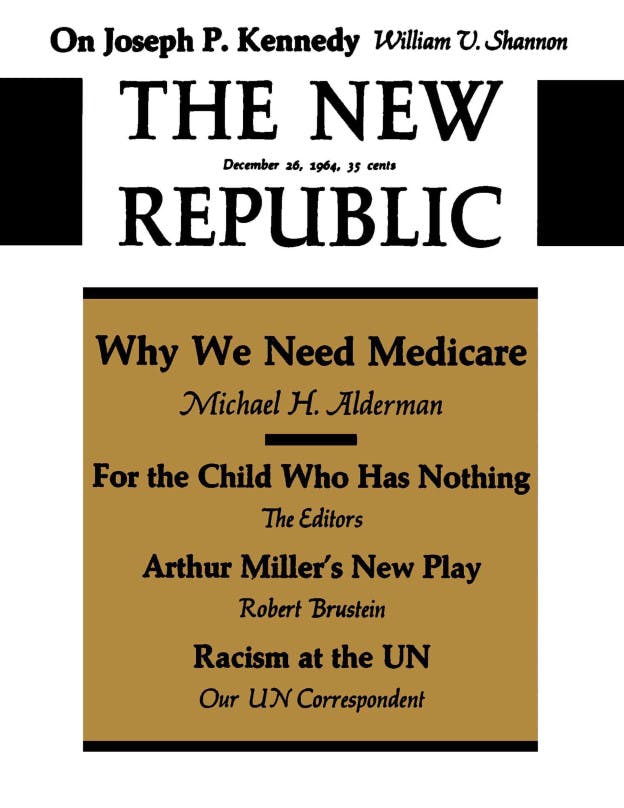
“In any year the typical elderly individual has a 13-percent chance of being hospitalized. The brutal economic meaning of those high costs is that advancing medical science has endowed many elderly couples with more life than they can afford.”
March 23, 1965
Mills, a fiscal conservative, objects to the King-Anderson bill as too expensive. He proposes an amended bill, which passes in the house the next month.
April 17, 1965 Reform Does Come (TRB)
“You have to spend a lifetime in Washington to understand, almost believing that great social reforms can't come. Then they do come. Take medicare….The current bill covers those of 65 or over. It's been a long, slow way. But can anybody seriously believe that...progress will stop with the oldsters?”
July 30, 1965
President Johnson signs Medicare into law.
